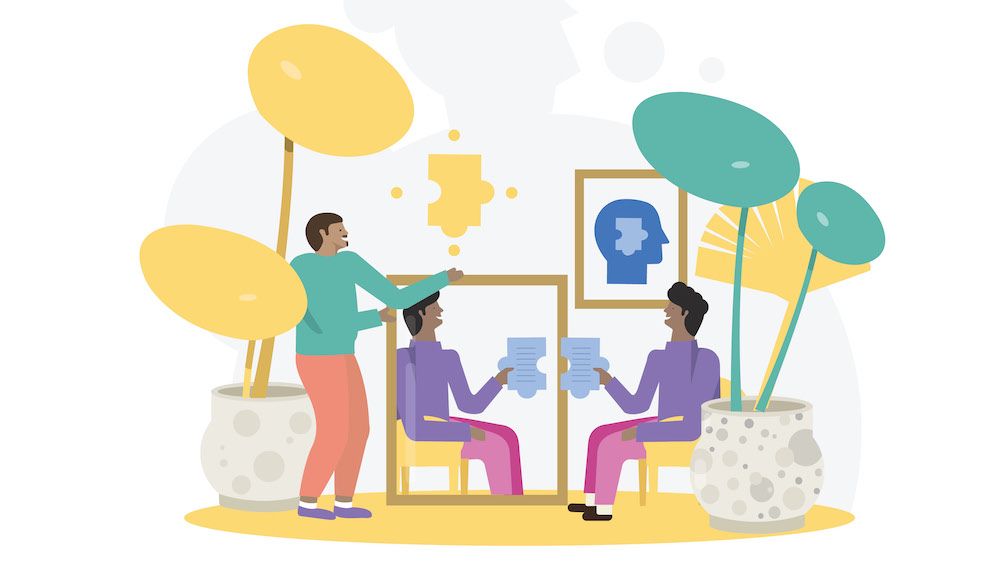Reaching out for help can be daunting, and a fear of the unknown can hold us back. So we’re here to make that next step less scary, as we share what really goes on in cognitive behavioural therapy
A pounding heart, sleepless nights, and worrying thoughts. For those who live with anxiety, these symptoms will be all too familiar. Some find that cognitive behavioural therapy (CBT) is an effective way to help manage anxious thoughts and feelings, but the idea of your first session might be a cause for even more worry.
CBT is a talking therapy that addresses cycles of negative thoughts and feelings. Commonly used to treat anxiety and depression, therapy sessions focus on interrogating patterns of unhelpful thinking and behaviour in order to develop practical coping skills.
If you’re considering starting CBT, or have already been booked in for your first session, knowing what to expect can help to ease any concerns. We spoke to counselling psychologist Dr Danielle Sampaio to find out more.
Know the basics
“CBT is a here-and-now therapy that offers a way to understand your current thought processes, and how they are contributing to the problems that you are having,” says Dr Sampaio. “It offers a way to restructure your thoughts, so that you can develop more helpful and balanced ways of thinking and behaving in relation to specific issues and circumstances.”
Over the course of your treatment, you’ll build a toolkit to understand your anxiety, and develop ways to address troubling thoughts. Sessions can take place in a group setting or one-on-one, and each session is about 50 minutes long.
"The goal of CBT is to equip you with the tools you need to manage your anxiety once the sessions are over"
Assessing the problem
Your therapist might be interested to know what is driving you to seek treatment, any past therapy that you’ve already had, and your hopes for these sessions. This will also be your opportunity to tell your therapist about the development of your anxiety, and what specific issues you’re experiencing.
“You might be asked to complete a questionnaire to measure the extent and type of anxiety, and any other issues that your therapist should know about,” says Dr Sampaio. “You don’t need to prepare anything, but if it helps you could write some notes beforehand, or things that you want to say or explain.”
Building a collaborative relationship
Seeking mental health support can sometimes feel exposing. But in order to effectively treat your condition, you need to be vulnerable and open about what is troubling you, and being able to create a relationship based on trust and honesty is key to getting the care you need.
“Your therapist will want to get to know your story, strengths, and struggles,” she says. “This helps them to piece together how your experiences may be affecting you.”
Although it can be challenging, be prepared to approach CBT with an open mind, and a willingness to share. Your therapist will be experienced in guiding and supporting you through the process.

Doing your homework
CBT doesn’t just take place within therapy sessions – most therapists will assign exercises to complete in your own time. This could be something like keeping a diary, or examining your thinking style each time you have a particularly pervasive worry.
“The therapy will encourage you to practise what you are learning in between sessions, to consolidate progress,” Dr Sampaio says. “This will help the therapist to understand what happens in a real-life example. Some clients worry about this part, but it’s not like school homework – you won’t be told off if you don’t do it!”
Learning therapeutic tools
The goal of CBT is to equip you with the tools you need to manage your anxiety once the sessions are over. You can expect to learn practical techniques to help keep worries in check, and to function through periods of poor mental health.
“This could be things like breathing exercises to help with panic, mindfulness, or compassionate exercises that build tools to help you to calm down,” Dr Sampaio says. “Some of these you will practise with your therapist, and others you will do in your own time. You’ll also have regular review sessions to consider how the work is going, and how these tools are helping.”
These tools are there for you to call upon as you take the next steps, beyond therapy – like a first aid kit in your backpack, they’ll help you help yourself through.
To connect with a counsellor to talk more about how CBT could help you, visit counselling-directory.org.uk


Comments